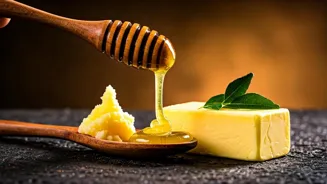Nutritional Showdown Begins
Ghee, often considered the golden elixir, is clarified butter with milk solids removed, making it lactose-free. Butter, on the other hand, contains milk solids,
proteins, and lactose. Both are high in fat and calories, but their specific nutritional profiles differ. Ghee boasts a higher smoke point, perfect for high-heat cooking, a boon for Indian cooking methods!
Ghee's Goodness Unveiled
Ghee shines with butyric acid, beneficial for gut health, a true friend to your digestive system. Rich in fat-soluble vitamins like A, D, E, and K, it supports overall well-being. The rich, nutty flavour enhances dishes, adding a touch of Indian magic. Consider the traditional practices of using ghee to enhance both taste and nutrition.
Butter's Buttery Charms
Butter brings its own set of charms. It's a source of Vitamin A and provides a creamy texture to your dishes. While delicious, butter might trigger lactose sensitivities for some. Butter, frequently used in continental cooking, offers distinct culinary applications, appealing to a diverse palette.
Daily Choice Criteria
The ideal choice hinges on your lifestyle, health, and dietary preferences. Those with lactose intolerance may lean towards ghee. For a flavour-packed experience, consider ghee. Moderation is key; both can be part of a balanced Indian diet. Consult a doctor for personalized guidance.
Health & Concerns
Excessive consumption of either can elevate cholesterol levels; portion control is crucial. Ghee is considered more shelf-stable than butter. Saturated fat content is high in both; use them sparingly. Embrace these in moderation to reap the culinary and nutritional rewards, aligning with your health needs!















